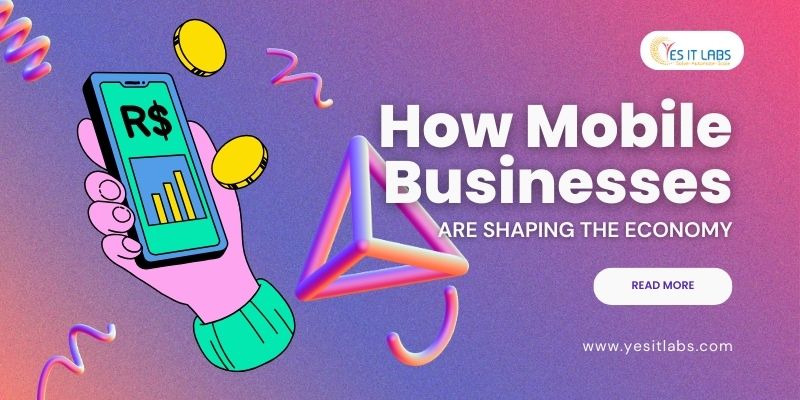The global economy is in the midst of a profound transformation, propelled by the unstoppable rise of mobile businesses. From nimble startups to industry titans, the explosion of mobile technology is redefining commerce, consumer behavior, and wealth creation. With smartphones now an indispensable part of daily life—serving over 5.5 billion unique users worldwide—mobile businesses aren’t just keeping pace with the digital age; they’re steering its course.
This article explores the latest trends, fresh data, and actionable insights into how mobile businesses are molding the economic landscape, offering a front-row seat to this dynamic evolution.
The Mobile-First Revolution: A New Economic Engine
The shift to mobile is undeniable. Mobile devices now dominate over 70% of global internet traffic, cementing a mobile-first reality that businesses can’t ignore. Companies are doubling down on apps, responsive platforms, and frictionless user experiences to stay competitive.
The mobile app market, for instance, is a powerhouse, with consumer spending projected to hit $270 billion annually, fueled by cutting-edge app development, lightning-fast 5G networks, and a consumer base that demands instant access. Partnering with an iOS mobile app development company can give businesses a competitive edge in crafting seamless, high-performing apps tailored for Apple’s ecosystem.
The Rise of Mobile-Driven E-commerce
E-commerce exemplifies this shift. A whopping 70% of online purchases are now completed on mobile devices, with giants like Amazon and Alibaba setting the pace alongside a wave of smaller players using apps to connect directly with customers.
This isn’t just about convenience—it’s about delivering speed, accessibility, and tailored experiences that are breathing new life into economies globally. In Southeast Asia, for example, mobile-driven marketplaces have boosted small business revenue by 30% in urban hubs, proving that mobile isn’t just a tool—it’s a lifeline.
The Gig Economy’s Mobile Momentum
The gig economy is another arena where mobile businesses shine. Platforms like Uber, DoorDash, and Upwork have long harnessed apps to link workers with opportunities, but the scale today is staggering. The gig economy now contributes $500 billion to global GDP, with mobile apps acting as the glue binding freelancers, service providers, and clients.
The Impact of Hyper-Local Mobile Businesses
Hyper-local mobile businesses are taking this further. In regions like India and Latin America, “super apps” such as Grab and Rappi bundle ride-hailing, food delivery, and even financial services into one platform.
These ecosystems are spawning millions of micro-entrepreneurs—think delivery riders, freelance designers, or street vendors—who need only a smartphone to thrive. In Nigeria, mobile gig platforms have slashed youth unemployment by 12% in urban areas, showcasing how mobile businesses are rewriting the rules of economic inclusion.
5G: The Turbocharger of Mobile Commerce
The rollout of 5G networks—now powering over 2.5 billion connections worldwide—is a game-changer for mobile businesses. With blazing speeds and near-instant responsiveness, 5G is unlocking applications that are revolutionizing entire industries.
Transforming Retail with 5G and AR
In retail, augmented reality (AR) shopping apps let customers “try on” outfits or preview furniture in their homes, cutting return rates by 20% and boosting engagement. Surveys show 55% of U.S. shoppers now favor AR-enabled apps, driving retail revenue up by double digits.
Beyond shopping, 5G is transforming healthcare and manufacturing. Telemedicine apps with real-time video and AI diagnostics are bridging gaps in rural care, while IoT-powered mobile apps in factories deliver live machine data to engineers’ phones. These innovations are adding $50 billion to the U.S. economy annually.
Also Read: Transforming Augmented Reality for iOS Apps
AI and Personalization: The Economic X-Factor
Artificial intelligence (AI) is the magic ingredient supercharging mobile businesses. By weaving AI into apps, companies are crafting experiences so personalized they feel bespoke.
Streaming services like Netflix nail viewing predictions, while e-commerce apps like Shein tweak recommendations based on subtle user cues. AI-powered apps boast 25% higher retention rates, funneling billions in extra revenue to businesses.
AI-Powered Startups and Small Businesses
For small players, AI is a great equalizer. Low-code platforms with built-in AI let entrepreneurs with zero coding experience launch apps in weeks. Over 70% of new apps today are born this way, sparking a startup boom.
Take Jane, a florist in London: using an AI-driven app builder, she created a delivery app that tripled her orders in six months. Stories like hers highlight how mobile application developers are unleashing a tidal wave of innovation and economic activity.
Mobile Payments: Redefining Financial Flows
Mobile wallets and fintech apps are rewriting the rules of money movement. Digital payment giants like Apple Pay, Google Pay, and India’s UPI now process trillions in transactions, with mobile payments claiming 60% of global financial activity.
Financial Inclusion Through Mobile Banking
Fintech apps are also banking the unbanked—over 1 billion people globally—via mobile-first solutions.
- In Africa, M-Pesa’s mobile money system powers 10% of the continent’s GDP.
- In India, UPI transactions have surpassed 50 billion annually, cutting reliance on cash by 40%.
These shifts aren’t just convenient—they’re reshaping financial power dynamics worldwide.
Sustainability and Mobile Businesses: A Green Economic Wave
Sustainability is now a core driver for mobile businesses. Eco-savvy consumers are flocking to apps that champion green living—think carbon trackers or second-hand marketplaces like Poshmark, which saw a 35% sales spike last quarter.
The Circular Economy and Mobile Innovation
Mobile businesses are also fueling circular economies.
- Peer-to-peer apps like Venmo and Depop are set to process $2.3 trillion in transactions, promoting reuse over waste.
- In Europe, resale apps have cut textile waste by 8%, supporting local economies while aligning with climate goals.
This green shift is proving that profitability and purpose can coexist.
Challenges and Opportunities on the Horizon
Mobile businesses aren’t without roadblocks.
- Cybersecurity threats loom large, with mobile fraud up 30% as transactions skyrocket.
- The digital divide persists, as some regions struggle with connectivity and smartphone penetration.
Solutions to Overcome Barriers
Developers are fighting back with biometrics, blockchain, and secure app development. Companies looking to stay ahead often hire iOS app developers to create secure, user-friendly solutions.
Despite these challenges, the upside is immense. Mobile businesses are sparking entrepreneurship, streamlining industries, and tapping new markets.








